Student Honors: Bach Baroque 2021
Wednesday, May 19, 2021 | Student Awards and Honors
Bach/Baroque Festival, an annual event sponsored by Northern Virginia Music Teachers Association, was held in remote format this year, due to the coronavirus situation. Participating students prepared and recorded performances of two different Baroque-era (1600-1750) pieces, from memory. Congratulations to Elena Valdez-Torres, who received the top rating of Superior. Receiving both the top rating of Superior and also the additional competitive award of Honors were Owen Rollins, Anne Severino, Varun Veluri, and Philip Wang.
Student Honors: NFMC Festival 2021
Thursday, May 13, 2021 | Student Awards and Honors
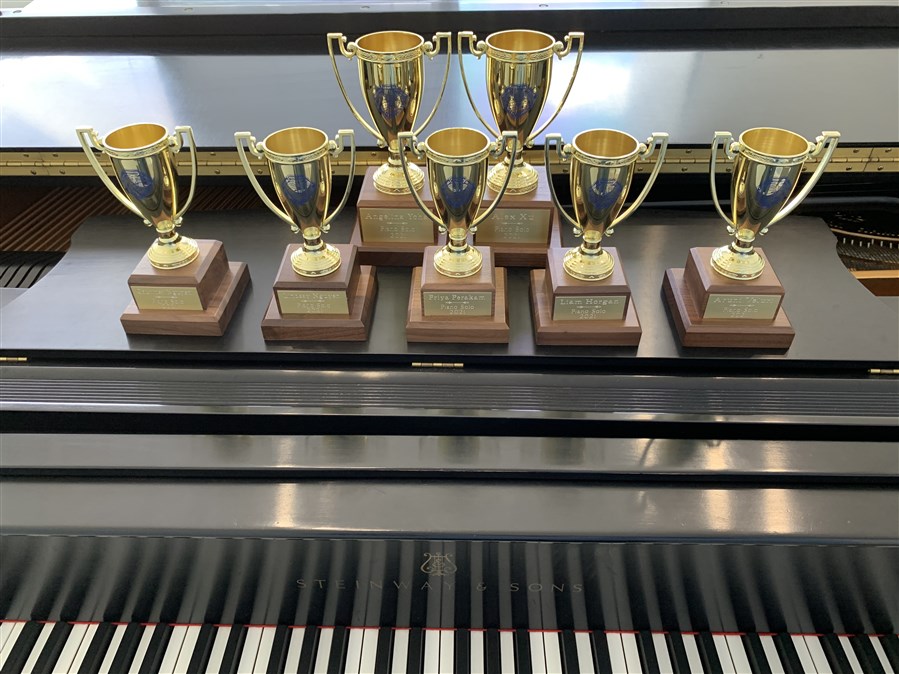 On March 12 & 13, 2021, many of our students participated in NFMC Spring Festival, hosted locally by Springfield Music Club. Due to the coronavirus situation, this year's festival was conducted via Zoom, which allowed every participating student to present a live (not pre-recorded) performance. Congratulations to the following students who earned the top score of Superior:
On March 12 & 13, 2021, many of our students participated in NFMC Spring Festival, hosted locally by Springfield Music Club. Due to the coronavirus situation, this year's festival was conducted via Zoom, which allowed every participating student to present a live (not pre-recorded) performance. Congratulations to the following students who earned the top score of Superior:
Sebastian Annett, Alexa Garcia, Sarah Hellman, Noa Herzog, Valentina Hong, Helena Horowitz, Maya Lang, Vihaan Mathur, Caeli McIntosh, Keshavan Nair, Katrina Nelson, Kaitlin Nguyen, Gizem Onerci, Erin Pak, Ryan Qi, Eliana Rougle, Pelin Sarac, Karthik Thyagarajan, Elena Valdez-Torres, Abigail Wang, Hannah Wang, Philip Wang, Ethan Williams
In addition to earning the top score of Superior, the following students also received gold cups! These cups are awarded based on a point system. It takes a minimum of three years to earn your first cup.
Liam Horgan, Courtney Nguyen, Lindsay Nguyen, Priya Perakam, Aruni Veluri, Alex Xu (solo AND concerto!), Angelina Yoha, Varun Veluri (solo AND concerto!)
For Best Results...Foundations for Successful Piano Students
Wednesday, May 5, 2021 | Practicing and General Education
WE TEACH ALL AGES AND ALL STAGES We want all our students to love music. And we know that most students won’t grow up to be concert artists. Just the same, our fundamental goal is that each student experiences growth—month over month, year over year. And that, over time, this leads to substantial and durable skill at the instrument. With many years of experience, we know that the following foundations are necessary for student success. For best results…
PRACTICE INSTRUMENT Invest in the best-quality practice instrument you can, as soon as you can. An acoustic piano is strongly recommended for all ages and levels. A digital keyboard with full-sized, fully-weighted keys is acceptable for beginners. Anything less than full-sized fully-weighted keys is a toy, for our purposes. A bridge to buy you a few weeks to find a more suitable instrument, perhaps. Nothing more. You can invest in lessons…but without a quality acoustic piano, you’ll always be working against an invisible headwind. You’ll never explore your potential.
PRACTICE CONSISTENCY People with healthy teeth brush their teeth every day, or at least most days! Successful younger students practice every day. Daily practice is useful for all ages and levels, but the younger the student, the more vital it is to the student’s progress.
PRACTICE QUANTITY It’s not uncommon for a dedicated youth gymnast to spend nine hours per week in the gym. Even a recreational youth soccer player spends about three hours per week in season. Effective practice takes time. You don’t want to be watching the seconds tick by as you practice, listlessly waiting for your timer to buzz: “practice is over!” That won’t work! But without a lot of repetitions and a lot of time, you won’t progress in your skill. Week by week, you’ll need at least three hours of at-home practice in addition to your lesson. Spread over the week, that’s about 30 minutes per day. Youngest beginners may work up to this over the course of a few months. Consistency counts more than time for the youngest. But for everyone else: with less time, you’ll make little, if any, progress. With more time, you’ll make more progress. 30 minutes is just a ballpark to help you identify the line between adequate and inadequate for elementary-level students. It’s not enough to reach more advanced skill levels. Advanced students commonly require six to nine hours per week of at-home practice to continue to progress in skill.
PARENT SUPPORT Young children learn music the way they learn language: in the home and in the world, alongside their parents and caregivers. When a young child (ages 4 to 8) enrolls in piano lessons, it’s a journey that the parent and child take together. Attending lessons together and practicing together each day with a spirit of joint exploration are essential. For slightly older students (ages 8 to 12) parent engagement, assistance, and supervision can greatly increase the efficacy of the student’s practice. Even for older students (ages 10 to 12 and older), parent engagement and attention can still be useful. While all students will someday need to practice and learn independently, the process of acquiring this independence takes many years of support.
RECITALS Some students are natural performers and others are reluctant. Either way, when you have an event to prepare for, you’re more likely to do better work. When you can celebrate the achievement of your successful performance, you build your confidence and you make it more likely that you will look forward to, and be motivated by, future performance opportunities. Without the first recital, there is no second recital!
WORKSHOP CLASSES Some of us are introverts and some of us are extroverts. But even introverts need a peer group! Could you imagine going to school all alone with only one tutor and no other students? Our workshop classes are the heart of our community. They are a place to gain exposure, experience, confidence in sharing your music with others and will help you feel comfortable playing in recitals and other higher-intensity events. Workshops also let you set small benchmarks and goals. They give you access to new teacher perspectives and personalities. They are a place to make friends and learn from your peers.
EVENTS Performance events include non-competitive festivals, competitive events, as well as performance exams. In our Studio, no particular event is required of our students. But gaining independent feedback from expert evaluators and sharing music in the wider community are both invaluable for progressing students. Those who participate in outside events are more likely to stick with lessons and more likely to experience growth in their skill.
VARIETY Students enjoy lessons more and gain more durable skill when they study and enjoy different types of music. This means variety in all forms: style, genre, time period, technical exercise, and difficulty.
SUMMER PROGRAMS Few parents would encourage their child to go the whole summer without reading! Likewise with music. Learning is a year-round activity! That doesn’t always mean taking piano lessons every week. But keeping active with music-making, practice, and music-listening are essential to your long-term success. We offer a flexible Summer Session which allows our students to attend lessons when it is possible and convenient with no minimum commitments or fixed tuition.
THE CHICKEN OR THE EGG How do I know that my child will stick with lessons? Simply: no one knows for sure. Your child might stick with lessons, or she might not. Personality, lifestyle, aptitude, student interest, the student-teacher relationship…each plays a role. All are beyond the scope of this article. But the foundations on this list are vital. Which comes first? The talented student who plays with beautiful expression, or the student with a quality practice instrument? The happy and dedicated student, or the student with a consistent practice routine? We’ve seen many students with high aptitude or apparently strong potential who quickly loose interest and quit. We’ve seen students of moderate aptitude achieve tremendous skill at the piano.
FEELING OVERWHELMED? In this short article, we’ve described the foundations that are necessary for a specific type of success—which we define as month to month, year to year growth which one day results in substantial and durable skill at the piano. And we have started with a big assumption: that the student already has an interest in learning to play and that they show this interest through their demeanor at lessons and their attention to at-home practice. If you’re feeling overwhelmed: start by thinking about your goals are for your lessons and what is practical for your family. Do not allow the perfect to be the enemy of the good. Each day of your practice is like one step on a thousand-mile journey. You want that journey to lead somewhere, but you also want to enjoy the trip! Good luck and best musical wishes!
Spring Break 2021
Monday, March 29, 2021 | News
The Studio will be closed for Spring Break from Monday March 29 through Sunday April 4. We re-open on our usual school-year schedule beginning Monday, April 5.
Basic Piano Buying Guide for Piano Students and Piano Parents
Wednesday, March 17, 2021 | Practicing and General Education
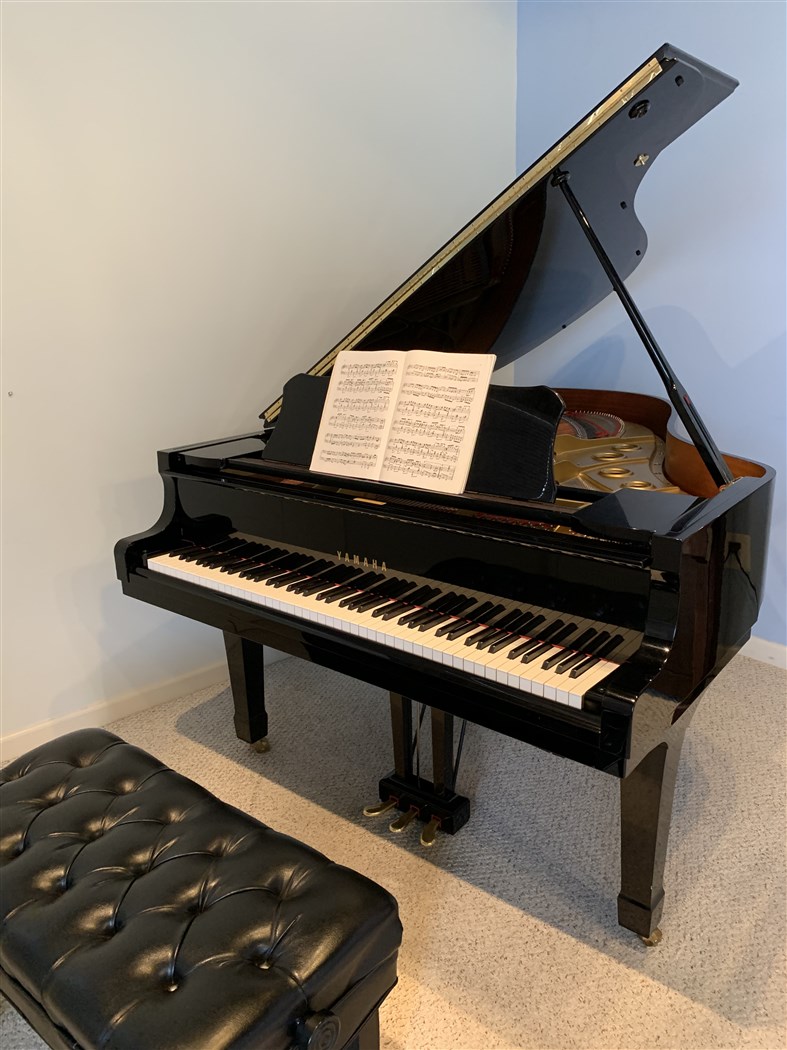 IN A NUTSHELL To maximize the chance of long-term success, invest in the best quality acoustic piano you can, as soon as you can. If you have the space and the means, buy a grand piano (over 5’9”). If a grand piano isn’t in the cards for you, buy a full-sized (46” to 52”) upright piano. A digital piano (or an acoustic piano in poor condition) will be a drag on student skill and motivation from day one. Even short practice sessions can add up to hundreds of hours over the course a couple years. When this time is spent on a quality acoustic piano, you have a higher chance of realizing your potential. In this guide, we quickly walk through all the ground-floor basics that new and returning piano students and piano parents need to know to begin making good purchase decisions.
IN A NUTSHELL To maximize the chance of long-term success, invest in the best quality acoustic piano you can, as soon as you can. If you have the space and the means, buy a grand piano (over 5’9”). If a grand piano isn’t in the cards for you, buy a full-sized (46” to 52”) upright piano. A digital piano (or an acoustic piano in poor condition) will be a drag on student skill and motivation from day one. Even short practice sessions can add up to hundreds of hours over the course a couple years. When this time is spent on a quality acoustic piano, you have a higher chance of realizing your potential. In this guide, we quickly walk through all the ground-floor basics that new and returning piano students and piano parents need to know to begin making good purchase decisions.
IF AN ACOUSTIC INSTRUMENT ISN’T POSSIBLE A digital keyboard with 88 weighted keys, stand, and pedal is acceptable for beginners and for students who are looking to learn basic keyboard skills but don’t imagine progressing to advanced levels. The most important feature to look for in a digital keyboard is “weighted keys,” which are essential to the development of finger-working muscles and a technique of controlled attack that will work on all instruments. Weighted keys are, in fact, not weighted, but spring-loaded so that they feel “heavy” as on a real piano. "Graded hammer action" is a marketing and technical term meaning that lower keys are slightly heavier than higher keys. This is a desirable feature and in the past a feature that separated higher quality instruments from budget models. "Semi weighted" means unweighted, at least for our purposes.
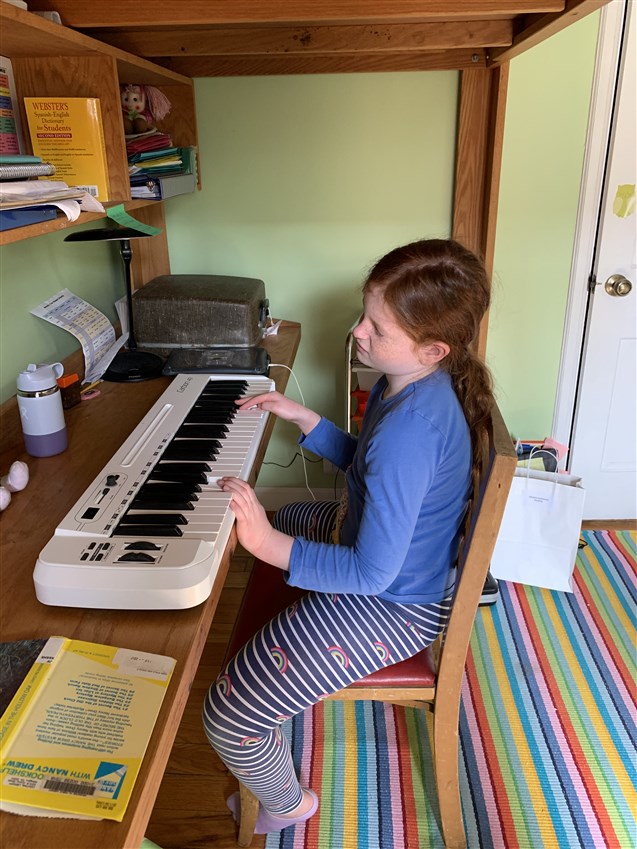 A FULL-SIZE KEYBOARD IS 88 KEYS You’ll rarely if ever find good-quality weighted keys on a less-than-full-sized keyboard. Do not be concerned about the space difference: an 88-key instrument will be no more than 14 inches wider than a 61-key instrument. All 88-key instruments (including all vertical acoustic pianos) are essentially the same width and take up the same amount of floor space.
A FULL-SIZE KEYBOARD IS 88 KEYS You’ll rarely if ever find good-quality weighted keys on a less-than-full-sized keyboard. Do not be concerned about the space difference: an 88-key instrument will be no more than 14 inches wider than a 61-key instrument. All 88-key instruments (including all vertical acoustic pianos) are essentially the same width and take up the same amount of floor space.
OTHER DIGITAL KEYBOARD FEATURES Many common electronic keyboard features can increase student engagement, especially in the short term. While these bells-and-whistles can be fun, they are unnecessary for basic musical and technical development. Recording capability, a built-in metronome with digital display, and a dual-headphone jack are useful—but not essential—features for student use.
DIGITAL VS ACOUSTIC An acoustic piano is an instrument which has strings and produces sound mechanically, without electricity. If you have to plug in your piano, it's digital (or electronic) instrument. An electronic keyboard is, at best, a poor substitute for a real piano. When a student learns to play on an acoustic instrument, they have the potential to learn how to manipulate a complex machine that can produce infinite gradations of tone and expression; when a student learns to play on a digital piano, they are pressing a button which prompts a computer chip to play a recording of a real piano. Let’s be honest: if you are trying to learn classical music or any sort of advancing piano technique on a digital keyboard, your instrument is limiting your progress…tremendously. Both practice time and your technical/physical skill accumulate from your first lessons. You can't wait until you are at an advanced level...because without adequate practice time on an acoustic piano, you are so much less likely to reach an advanced level! With the wide range of pianos and price ranges, a decent used acoustic piano can be found at a price you can afford. Even your grandparent’s old and worn upright—if in good condition—is preferable to a new digital keyboard. Again, don’t worry about the size of the instrument: a vertical piano takes up exactly the same amount of floor space as a digital keyboard.
HYBRID PIANOS A small but growing market segment seeks to bridge the divide between acoustic and digital instruments. Manufactures call these instruments “hybrid” digital pianos. Most hybrid pianos currently in use in the U.S. were made by Yamaha, but other manufactures (Kawai, Roland, Casio) also offer similar products. These instruments replicate the entire action of an acoustic piano and replace the usual touch-sensors with more sophisticated optical sensors. Hybrid digitals come remarkably close to the feel of an acoustic instrument, so much so that they can’t really be compared to traditional digital keyboards. But they also cost nearly as much as comparable acoustic instruments! Consider a hybrid piano if money is not a major limiting factor but lifestyle considerations are. (Frequent and unpredictable moves? High-rise apartment with neighbors on all sides?) In other cases, buy an acoustic piano. Be careful when shopping: at first glance, some high-end expensive digital pianos may be mistaken for hybrids.
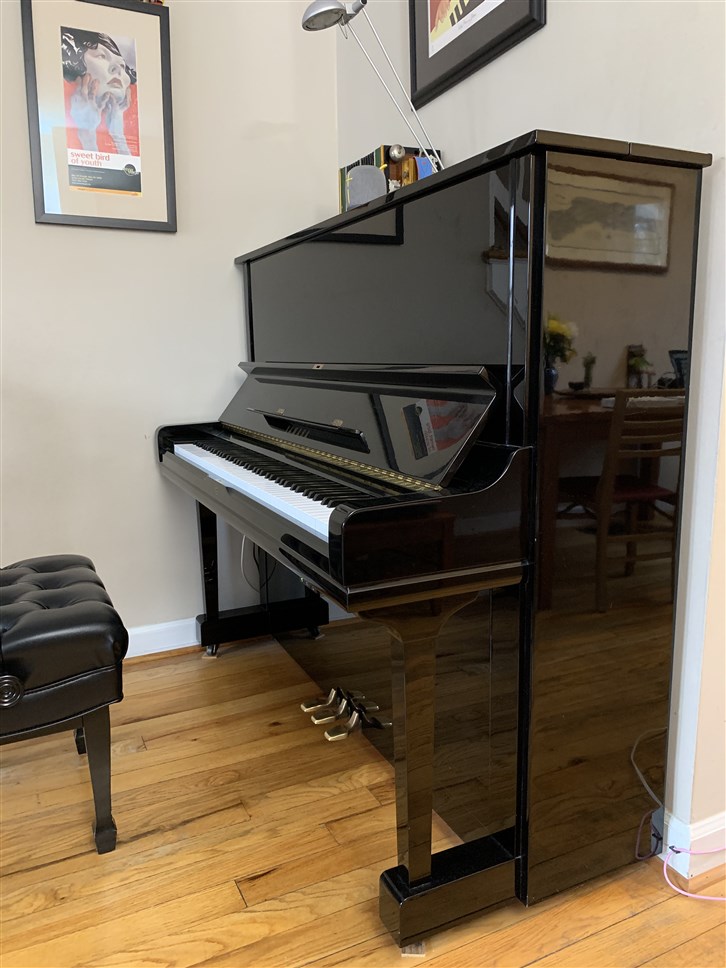 ACOUSTIC PIANOS Vertical (or upright) pianos are usually described by the following size categories: Spinets (36”); Consoles (41”); Studios (45”); and Uprights/Professional/full-sized (50”). Measurements are approximate and refer to the height of the piano from floor to top. Spinets and consoles were for many decades very popular entry-level home pianos; few have been made since 1990 as the low-cost segment of the market has shifted to digital keyboards, for good reason. If you can get an old spinet or console for free, or close, it could make a good starter piano, but in other cases, these should be avoided. As for the difference between studios and uprights: all things being equal, taller is better. Buy a full-sized instrument if you can. But any of these types, new or used, are suitable for beginner and intermediate students if the instrument is in good condition.
ACOUSTIC PIANOS Vertical (or upright) pianos are usually described by the following size categories: Spinets (36”); Consoles (41”); Studios (45”); and Uprights/Professional/full-sized (50”). Measurements are approximate and refer to the height of the piano from floor to top. Spinets and consoles were for many decades very popular entry-level home pianos; few have been made since 1990 as the low-cost segment of the market has shifted to digital keyboards, for good reason. If you can get an old spinet or console for free, or close, it could make a good starter piano, but in other cases, these should be avoided. As for the difference between studios and uprights: all things being equal, taller is better. Buy a full-sized instrument if you can. But any of these types, new or used, are suitable for beginner and intermediate students if the instrument is in good condition.
GRAND PIANOS A good grand piano over 5’9” is a major improvement over an upright. The cost of a decent grand is more than that of a comparable upright, but it’s perhaps not much as some people imagine. If you have the space and the means for a grand piano, rest assured that a good piano may outlive your children, will not lose value to the same extent that ordinary consumer products do, and will be superior in touch, reliability, and tone quality to most uprights. Avoid grands under 5’3”; instead consider a full-size upright. The term “baby grand” is not a reliable indicator of a piano’s size; find out a piano’s true size by measuring the length from end to end.
EDUCATE YOURSELF! If you’re purchasing a good acoustic piano, you’ll be making a substantial investment. It’s not unlike buying a car…but most people are more comfortable comparing cars than pianos! Among many different web resources, consider: rickjonespianos.com, pianopricepoint.com, pianobuyer.com, and of course your local dealers. In the D.C. area, consider: Jordan Kitts (Yamaha); Steinway Gallery (Steinway, Boston, Essex); The Piano Company (Kawai); Piano Craft; Rick Jones (good source for previously owned); Orpheus Music (good source for previously owned plus new Mason & Hamlin and Schimmel) If you have another good local dealer to recommend, let us know! Invest a little bit of time learning about the different choices within your market segment; you’ll be more able to evaluate information you get from dealers and more confident as you begin to narrow your options and make choices.
DEALER TIPS AND TRICKS Go to a dedicated music dealer. Skip the big box stores. If you can’t consider an acoustic piano, you may also check out a pro-audio dealer such as Sweetwater Sound. They may offer comparable digital pianos at lower prices than a piano dealer, especially at the lower end of the digital piano market. With certain brands, manufacturers distribute their instruments exclusively through a single retailer in a given geographic area. This means that your options for shopping around are restricted—at least for new instruments. Each local dealer can only sell the stock they have and the brands they represent. Be skeptical when a dealer gives you negative brand information about a product they don't sell. Most dealers list prices that are a little high, with the expectation that they will be bargained down somewhat. The potential for negotiation varies not only from dealer to dealer, but from brand to brand. If the dealer won’t negotiate and/or their prices are not close to what you’re expecting, find another dealer, or consider a different brand.
BRANDING TODAY With a few exceptions (most notably Steinway), “American” brands don’t mean much anymore. Some Japanese and Korean manufactures at one time made pianos in U.S. factories; most “American” brand names now come from Korea or China (and sometimes Japan). Some European-sounding names actually come from Europe, most come from Asia. Some new Yamaha piano models these days come from Japan but others are made in Indonesia. Both are acceptable for student use, but they are not directly comparable instruments—something you could guess by the large price difference between them. This brings up a sometimes-overlooked factor you may wish to consider when evaluating a piano: where and when was it was made. For example: a piano made in China in 1995 is almost certainly to be avoided, but a new piano made in China today under a respected brand name may be a suitable and reasonably-priced option.
UNIVERSITY SALES The pressure to buy is higher than at a regular retail store, but in most cases, these sales are run by the same local dealers you could visit at any time of the year. You can often get a lower price than at the dealer’s showroom, but not always. Go and look, but don’t be pressured to buy if you’re not ready!
TRADE UP CREDITS If you are buying a quality acoustic piano, it is unlikely that you will ever attempt to use trade-up credits. If you do use them, they may save you a little money, but they won’t save you a lot. A good-quality piano will retain much of its value, and dealers looking to make a sale are apt to be generous with the trade-in allowance, regardless of where you purchased the instrument.
GET A WARRANTY If you’re buying from a dealer or technician, your piano should come with a one-year warranty, regardless of whether it is new or used. Decline any deals that do not include this minimum level of protection. Reputable dealers may (and really should!) offer a longer warranty.
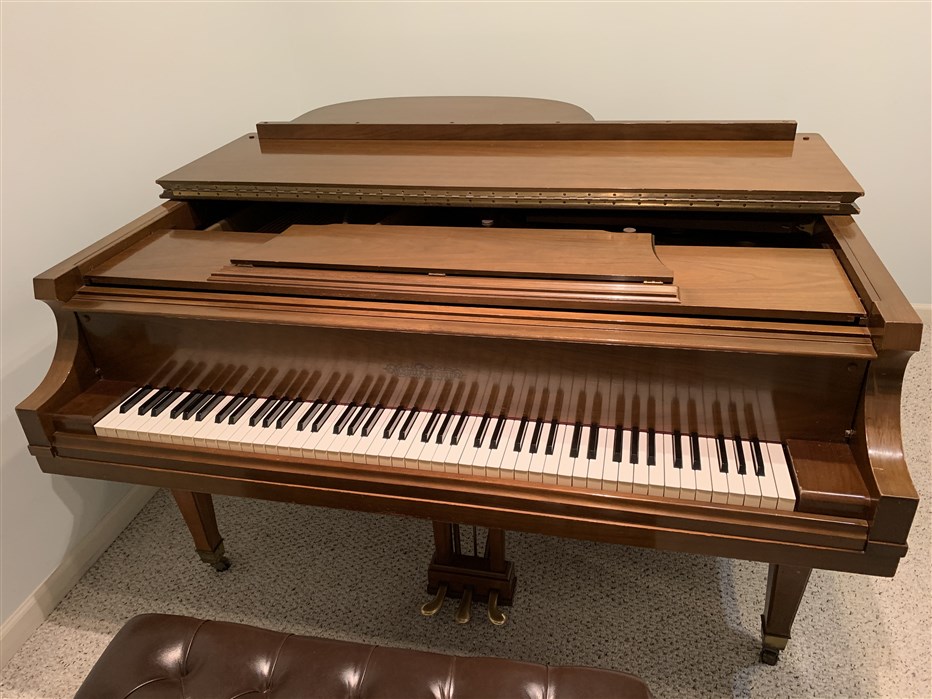 This piano is over 50 years old...and it sounds great!
This piano is over 50 years old...and it sounds great!
BUY USED When it comes to used pianos, it’s a buyer’s market! While you are recovering from new-piano sticker shock, consider whether a used piano might be suitable for you needs. You can usually get a much better deal buying a piano from a private individual than you can from a dealer; such transactions are also very risky for the buyer. It is unwise to buy from a private individual without having a trusted friend with some keyboard skills test out the piano first—and really, it’s best to hire an experienced technician to examine the instrument before you commit. Expect to pay $125-$250 for this service; it’s money well spent. If you're looking at the bottom end of the private market ($0 to $1500) you may get lucky and find a hidden gem! They’re out there! But you also need to be ok with the possibility that you'll be junking the instrument and upgrading at some unknown point down the road…and it might be sooner, rather than later.
YOU CAN DO IT! Unlike most consumer products, a piano is an investment for a lifetime—take your time, and good luck!
ADDENDUM: SO...HOW MUCH IS THIS GOING TO COST?
All prices are based on our personal experience with the Washington, DC-area market, over the course of many years. The price ranges on the market are truly staggering and range from free to nearly $200,000! The information below is only intended to get you a "ballpark" idea of what different types of instruments may cost.
ACOUSTIC INSTRUMENTS FROM DEALERS Used upright pianos of any quality go for $3000 and up. Used grand pianos start at around $8000. New pianos of any quality start at around $5000 for uprights and $11,000 for grands. Be skeptical of lower prices. Instead, consider used pianos. Remember these are ballpark starting prices for legitimate instruments—quality increases with higher prices at reputable dealers and the point of diminishing returns doesn’t start to be a factor until you reach at least triple the prices listed above: the Japan-made Yamaha U3 is among the best-quality upright pianos on the market today and its MSRP is around $15,000.
ACOUSTIC INSTRUMENTS FROM PRIVATE SELLERS You can usually get a used acoustic piano from a private seller for about ½ the dealer prices listed above—or less. Sometimes, much less. Usually, you’ll have to pay for moving and tuning—and most importantly, undertake the risk inherent in a private sale with no warranty.
DIGITAL KEYBOARDS The cheapest full-size digital keyboards start around $600; quality increases significantly as you pass the $1000 mark. The law of diminishing returns kicks in a bit over $2000, with the exception of a “hybrid” digital. The hybrid segment of the digital market starts at around $4000. Many models have a list price over $10,000. Buying a digital keyboard from a private seller is less risky than buying an acoustic instrument from an individual because it’s easier for you to test it out. If all keys work and seem to be of even weight (that is, you don’t find any heavy or sticky keys) and the speakers produce a good sound without distortion or static, you’re probably ok. You can usually expect to pay between 1/3 and 2/3 of the cost of a comparable new keyboard depending on the age of the instrument. Because prices have come down so low in recent years, you may find that 1/2 the price the original owner paid 10 years ago is pretty close to the current selling price for a comparable new instrument! It's a buyer's market. You can get a new entry-level digital piano for well under $1000, including stand, bench, and shipping. Keep this in mind when you're shopping for used. Most piano dealers won’t sell used keyboards; you may have to look at “pro audio” dealers to find used digitals in a store. It's fine if you can get one for free, but don't pay money for a used digital instrument over 15 years old. If something breaks, you probably will have a hard time finding parts to fix it. You should also exercise caution when considering a used hybrid digital piano, for the same reason.
Student Honors: Studio Master Class February 2021
Tuesday, March 9, 2021 | Student Awards and Honors
On February 20, 2021, we hosted our first-ever remote Master Class with guest artist John Healey. This was a chance for a handful of advancing students to challenge themselves in the demanding master class format and to get fresh perceptive from our wonderful guest artist! Congratulations to our participating students!
Aemi Bradford ♪ Sonatina Op. 20 No. 1, Kuhlau ♪ Owen Rollins ♪ Prelude and Fugue in A-flat Major from WTC 1, J.S. Bach ♪ Noah Tennenbaum ♪ Etude in C Major Op. 10 No. 1, Chopin ♪ Aruni Veluri ♪ Sonatina Op. 55 No. 1, Kuhlau ♪ Philip Wang ♪ Prelude and Fugue in c minor from WTC 1, J.S. Bach ♪ James Yao ♪ Romantic Sonatina, Schmidt
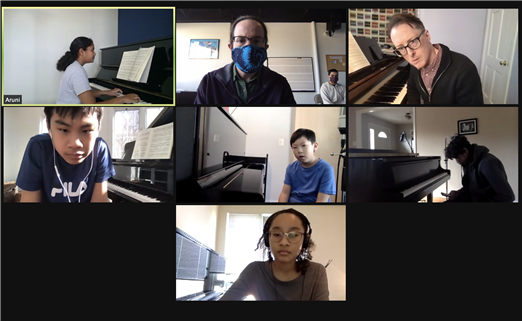
Student Honors: 2021 Golden Key
Sunday, March 7, 2021 | Student Awards and Honors
Many outside events have transitioned to a video-only format due to the coronavirus situation, but some events have been operating by video submission for many years! We are pleased to report that three of our students have been honored in one such long-running event, the Golden Key Music Festival. Congratulations to: Katrina Nelson (Silver) ♪ Zakariyya Scavotto (Silver) ♪ Alexa Garcia (Super Bronze).
Student Honors: December/January RCM Exams Part 2
Friday, March 5, 2021 | Student Awards and Honors
In addition to a handful of students already announced (see below), we've had two more results come through for the Fall/Winter RCM Exam season. Congratulations to Pelin Sarac (Level 7 Piano) Honors; and also to Elena Valdez-Torres (Level 4 Piano) First Class Honors.
Student Honors: December/January RCM Exams
Monday, January 25, 2021 | Student Awards and Honors
In addition to a handful of students who participated in RCM Exams in November, we had two students participate in December/January. Congratulations to Hannah Wang (Level 3 Piano) First Class Honors; and also to Alex Xu (Level 7 Piano) First Class Honors with Distinction.
2020 Winter Mini-Recital
Saturday, December 19, 2020 | News
In just one day (Sunday, December 13) we enjoyed exactly 99 student performances, separated into nine different short-short groups! No cupcakes this year (a pity!) but still a wonderful day full of music-making and community. The coronavirus situation prevented us from gathering together, in person. But we enjoyed the opportunity to connect with so many students and families in two different online platforms: Zoom, and YouTube Live.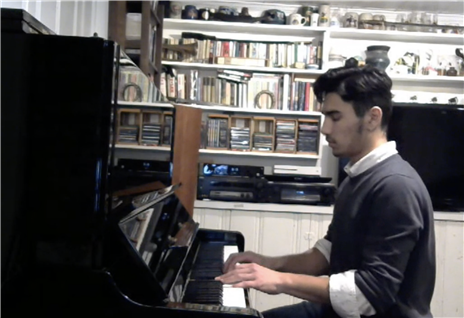
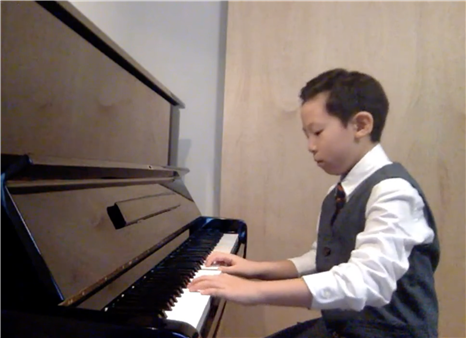
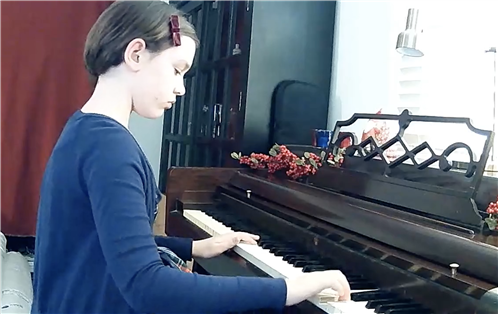
Student Honors: November/December 2020 RCM Exams
Thursday, December 17, 2020 | Student Awards and Honors
This comprehensive exam-based program operates year-round and we had a few students participate in the November/December session. Congratulations to: Helena Horowitz (Level 2 Piano) First Class Honors with Distinction ♪ Priya Perekam (Level 4 Piano) First Class Honors ♪ Karthik Thyagarajan (Level 6 Piano) First Class Honors with Distinction ♪ Aruni Veluri (Level 5 Piano) First Class Honors
Student Honors: NVMTA Fall Festival
Sunday, December 13, 2020 | Student Awards and Honors
This annual event was held this year using pre-recorded videos. Congratulations to the following students who received the top score of Superior. Owen Rollins♪Eliana Rougle ♪ Karthik Thyagarajan ♪ Kavya Thyagarajan ♪ Varun Veluri ♪ Aruni Veluri ♪ Alex Xu.
Student Honors: RCM Celebration of Excellence 2020
Saturday, December 5, 2020 | Student Awards and Honors
In the fall of 2020, RCM announced awards for top-performing students from the 2019-20 academic year. In our Studio, we had two students so recognized: Hannah Wang, and Alex Xu. Hannah received a State Award for earning the highest score in her level in the state. And Alex received a "gold medal" for earning the highest score in his level in the entire Southeast US region.
Student Honors: 2020 Studio Stars
Saturday, September 12, 2020 | Student Awards and Honors
Congratulations to our 2019-20 Studio Star Award winners! This in-house award is based on simple objective criteria. You can read more about how to earn the Studio Star via For Our Students in the menu. The coronavirus situation reduced the number of students who were able to earn the award this school year, so we are especially pleased with the students who were able to find a way to sustain their achievement even with this year's disruptions.
WORKSHOP PARTICIPATION (5+ classes attended with 5+ different pieces performed from memory)
Helena Horowitz, Ada Kiefer, Priya Perekam, Karthik Thyagarajan, Hannah Wang, and Alex Xu
40 PIECE CHALLENGE (40 different pieces learned to completion)
Jamison Cheng, Liam Horgan, Helena Horowitz, Hong-duc Pho, and Hannah Wang
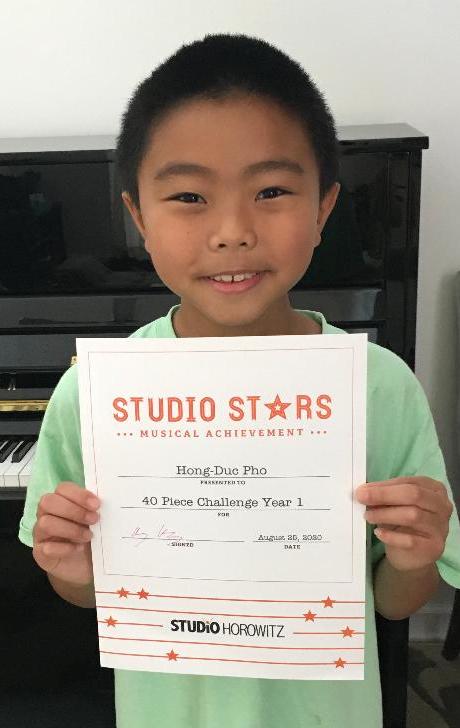
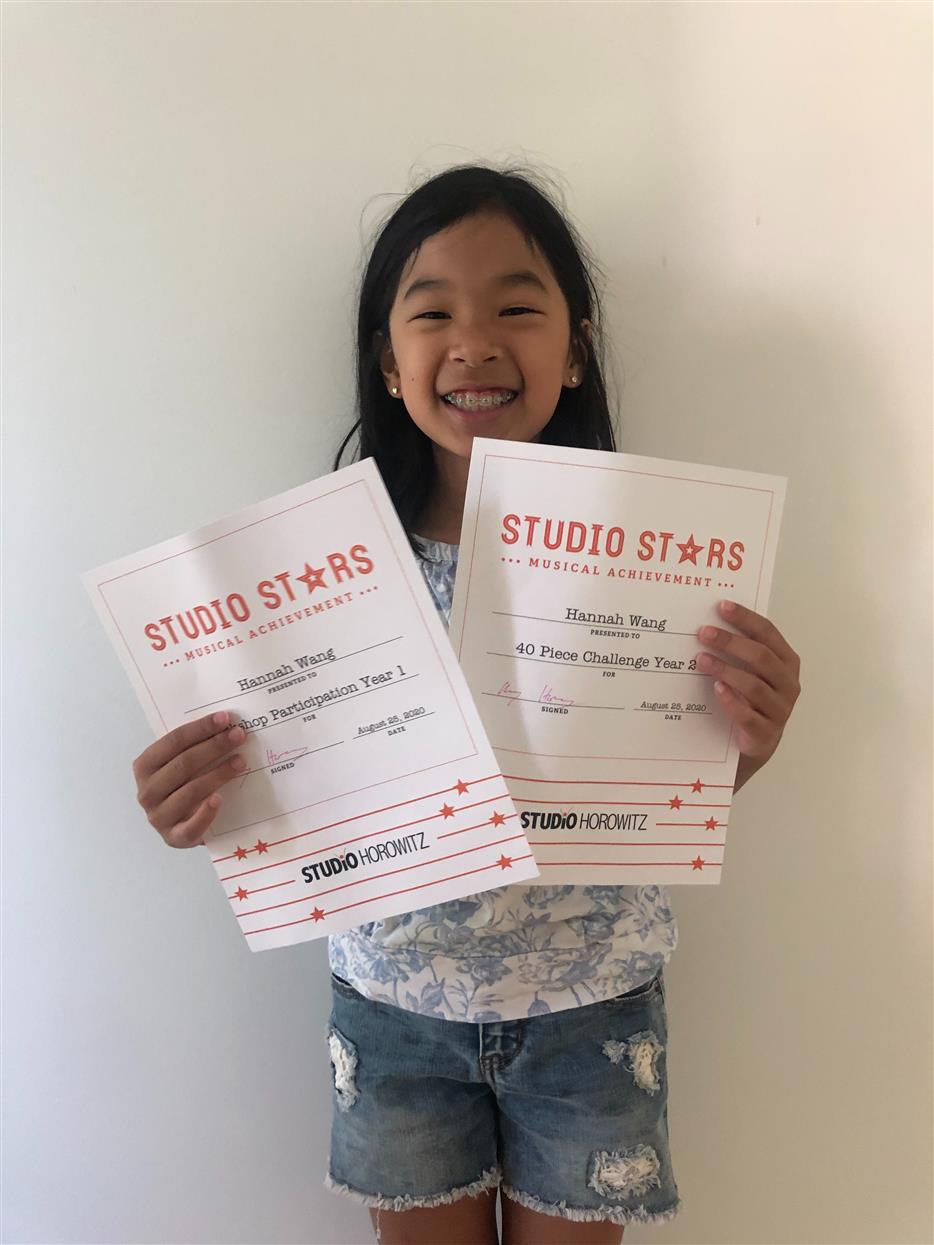
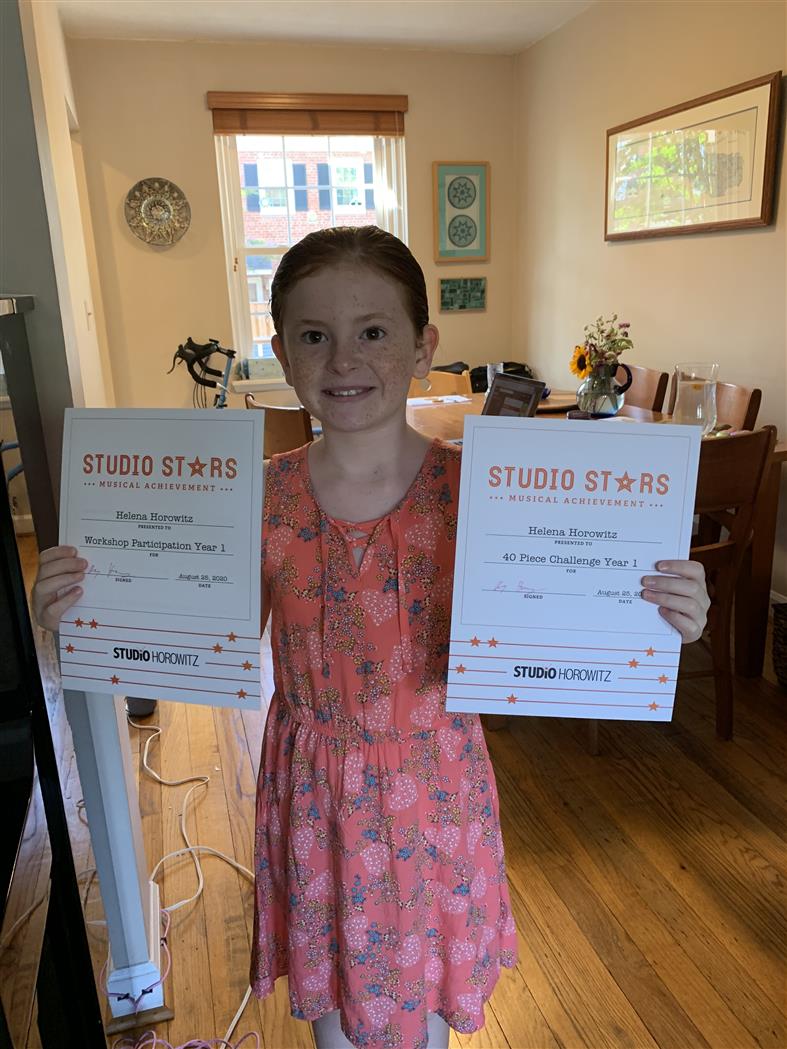
Student Honors: August 2020 RCM Exams
Monday, August 17, 2020 | Student Awards and Honors
Three of our students participated in the August 2020 session of the RCM Certificate program and all students earned top marks. Congratulations!
♪ Level 5 Piano ♪ Katrina Nelson ♪ First Class Honors
♪ Level 8 Piano ♪ Owen Rollins ♪ First Class Honors
♪ Level 8 Piano ♪ Philip Wang ♪ First Class Honors with Distinction
Special Remote Group Programs
Monday, August 3, 2020 | News
We knew that Summer 2020 would be like none other so we set out to support our interested students with innovative group enrichment classes with ultra-low tuition. Our only goal was to have fun and stay engaged while learning something new! Students joined us for the following special programs:
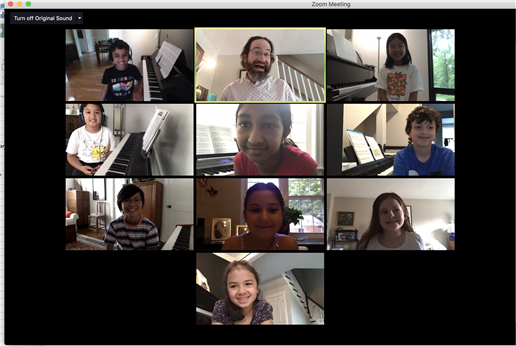 ♪ 1/2 Day Remote Piano Camp with Andrew Horowitz
♪ 1/2 Day Remote Piano Camp with Andrew Horowitz
♪ Remote Group Theory classes with Olga Robets
♪ Summer Performance Workshops with Aphrodite Mitsopoulou
♪ Digital Music Composition with our old friend Tyler St. Clare
Summer Recital Report 2020
Sunday, July 26, 2020 | News
We were not able to host our usual Summer Recital due to the coronavirus situation but we made alternate plans to celebrate and demonstrate the achievement of our students! Bright Starts (group beginners) participated in a live online recital using Zoom on June 6. We were joined by nearly 40 students and parents and families members from all over the world. Our individual-lesson students participated in a YouTube virtual recital and we received nearly 90 different video submissions from our students. We've prepared a YouTube playlist with a selection of 20 videos representing a variety of ages and levels as well as our teacher-introduction video. If you're interested in what we do, check it out!
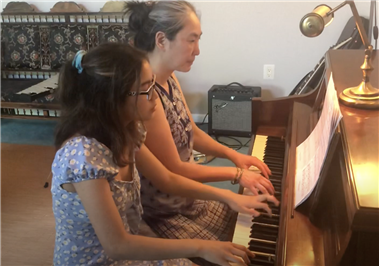
Student Honors: 2020 NVMTA Sonata Festival
Thursday, July 9, 2020 | Student Awards and Honors
Congratulations to Aruni Veluri and Philip Wang, who both earned the competitive award of "Honors" in the Sonata Festival hosted by Northern Virginia Music Teachers Association (NVMTA). This year, the coronavirus situation forced the usual in-person Festival to move online. It's great to see so many students overcoming the challenge of remote participation by preparing and presenting polished performances.
Student Honors: May/June 2020 RCM Exams
Friday, June 19, 2020 | Student Awards and Honors
The coronavirus situation closed down many of the events in which our students often participate, but some events did arrange for alternate programming online. In particular, we're proud of our students' accomplishments in completing demanding RCM Exams, even in this unusual time. Unlike many events, the RCM Exam attempts to make a rigorous yet noncompetitive comprehensive assessment of a student's accomplishment at a given level. This involves much more than preparing one recital piece! Students present a program of multiple pieces in varied styles and also are tested on music fundamentals such as scales, arpeggios, and aural skills. A related but separate program of theory exams assesses student achievement in that field. Read more at rcmusic.com. The designation "First Class Honors with Distinction" indicates a top score above 90%. Congratulations to our participating students!
♪ Level 1 Piano ♪ Helena Horowitz ♪ First Class Honors with Distinction
♪ Level 2 Piano ♪ Hannah Wang ♪ First Class Honors with Distinction
♪ Level 6 Piano ♪ Vihaan Mathur ♪ First Class Honors
♪ Level 5 Piano ♪ Tina Hong ♪ First Class Honors
♪ Level 5 Theory ♪ Karthik Thyagarajan ♪ First Class Honors with Distinction
♪ Level 6 Theory ♪ Vihaan Mathur ♪ First Class Honors with Distinction
♪ Level 6 Theory ♪ Alex Xu ♪ First Class Honors with Distinction
Student Honors: NFMC Festival 2020
Wednesday, June 17, 2020 | Student Awards and Honors
On March 12 & 13, many of our students were scheduled to perform at NFMC Spring Festival, a nationwide event sponsored and run at the local level by the Springfield Music Club. The coronavirus situation forced the club to cancel the in-person festival, but many students chose to participate in the alternate online programming which the club offered in late May and June 2020. The following students earned the top grade of "Superior" in this non-competitive event:
Tina Hong, Liam Horgan, Helena Horowitz, Vihaan Mathur, Courtney Nguyen, Lindsay Nguyen, Gizem Onerci, Priya Perekam (solo and concerto!), Owen Rollins, Pelin Sarac, Ian Sigler, Kavya Thyagarajan, Hanna Wang, Philip Wang, Angelina Yoha

